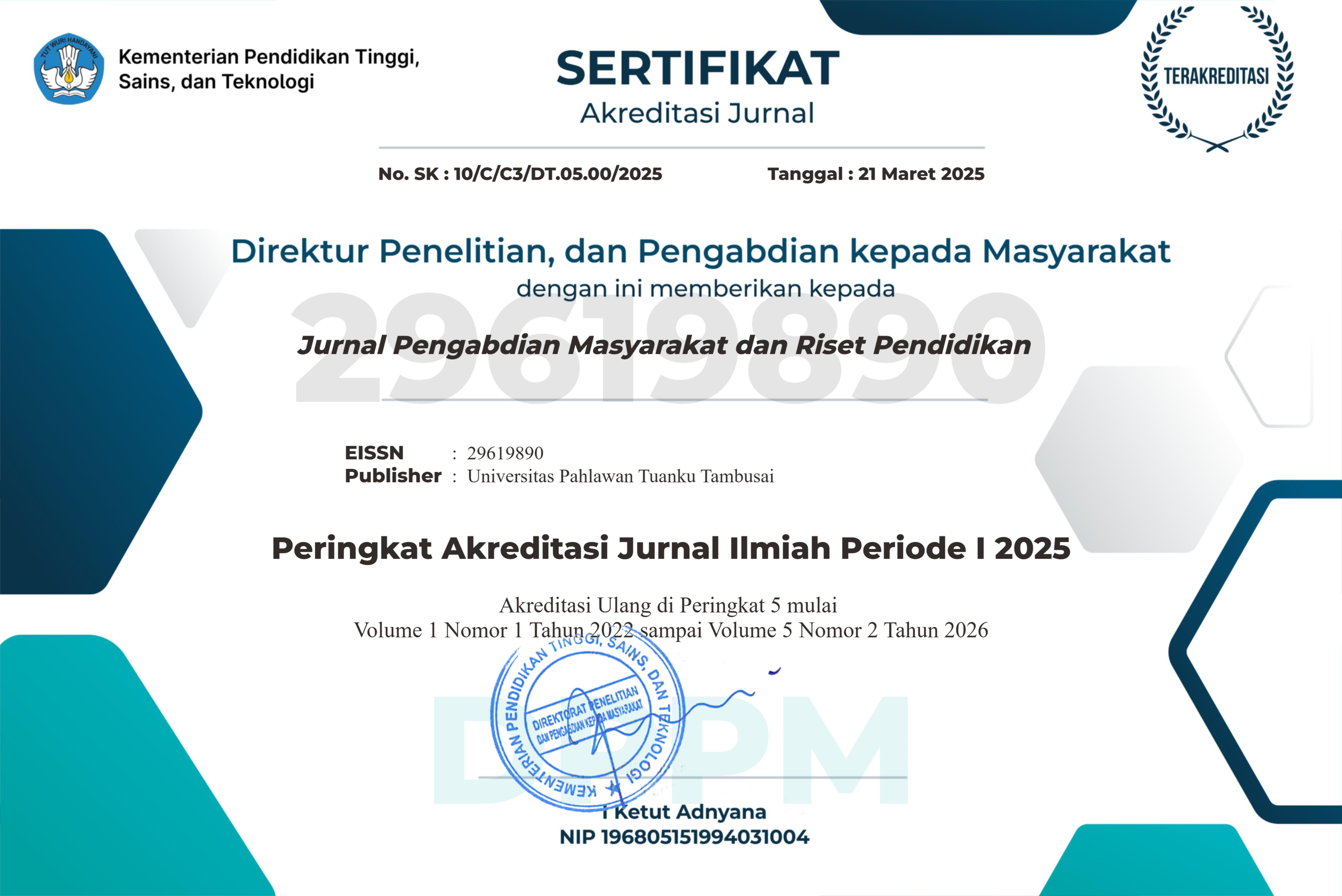Optimalisasi Inisiatif Desa Hijau: Transformasi Sosial dan Ekologis Desa Kandri, Kota Semarang Menuju Desa Berkelanjutan
Pengabdian
DOI:
https://doi.org/10.31004/jerkin.v4i2.3350Keywords:
Green Village, Masyarakat, Desa BerkelanjutanAbstract
This Community Service Program aims to increase the level of community compliance in paying Land and Building Tax (PBB), increase public understanding of the obligations and benefits of PBB payments, and reduce PBB payment arrears in the community. This community service was carried out at the Pak Wawi Tempe Factory MSME on Monday, October 20, 2025. Respondents in this service were employees and the community around the Pak Wawi Tempe Factory MSME. The results of the service show that the Community Service Activity (PKM) which focuses on Community Empowerment in Increasing Compliance with Land and Building Tax (PBB) Payments has had a positive impact on increasing knowledge, awareness, and participation of citizens in fulfilling their tax obligations. Through socialization activities, administrative assistance, and tax literacy training, the community has become more aware of the functions and benefits of PBB for regional development.
References
Amalia, R., & Arseyani, D. (2024). Praktik Akuntansi Hijau pada Perusahan Tambang Nikel PT. Vale Indonesia Tbk. Journal of Principles Management and Business, 3(01), 44-56.
Ardani Wayan; Sugiyanto E.K.; Fitriana; Bahasoan A.N.; Parmita R.; Syahril; Maharani; Noviar H. Lestari M; Ginting G.P.; Syafrial; Rosana M. EKONOMI HIJAU DAN BIRU: Strategi Keberlanjutan untuk Pertumbuhan Ekonomi. 2025. CV. EUREKA MEDIA AKSARA. Purbalingga.
Disterheft, A., Caeiro, S., Azeiteiro, U. M., & Leal Filho, W. (2015). Sustainable universities – a study of critical success factors for participatory approaches. Journal of Cleaner Production, 106, 11–21. https://doi.org/10.1016/j.jclepro.2014.01.030
Elkington, J. (1998). Cannibals with forks: The triple bottom line of 21st century business. Capstone.
Elkington, J. (2018, June). 25 Years Ago I Coined the Phrase “Triple Bottom Line.” Here’s Why It’s Time to Rethink It. Harvard Business Review.
Geng, Y., Sarkis, J., Ulgiati, S., & Zhang, P. (2013). Measuring China’s circular economy. Science, 339(6127), 1526–1527. https://doi.org/10.1126/science.1227059.
Halid, A., Yulianto, K., & Saleh, M. (2022). Strategi Pengelolaan Bank Sampah di NTB (Studi Kasus Bank Sampah Bintang Sejahtera). Journal of Innovation Research and Knowledge, 1(8), 763-770.
Hidayat, A., Sari, N. P., & Rahmawati, L. (2022). Pengembangan Desa Wisata Berkelanjutan melalui Penerapan Energi Terbarukan dan Ekonomi Sirkular. Jurnal Pembangunan Berkelanjutan, 4(2), 115–128.
IPCC. (2022). Climate Change 2022: Impacts, Adaptation, and Vulnerability. Contribution of Working Group II to the Sixth Assessment Report of the Intergovernmental Panel on Climate Change. Cambridge University Press.
Istiqomah, T., & Corsita, L. (2024). Implementation of Community-Based Waste Management to Improve Environmental Health in Villages. Sustainable Applied Modification Evidence Community, 1(2), 1-8.
Kementerian Pariwisata dan Ekonomi Kreatif. (2021). Laporan Kinerja 2020–2021. Jakarta: Kemenparekraf RI.
Kirchherr, J., Reike, D., & Hekkert, M. (2017). Conceptualizing the circular economy: An analysis of 114 definitions. Resources, Conservation and Recycling, 127, 221–232. https://doi.org/10.1016/j.resconrec.2017.09.005.
Kolk, A., Rivera-Santos, M., & Rufín, C. (2014). Reviewing a Decade of Research on the “Base/Bottom of the Pyramid” (BoP) Concept. Business & Society, 53(3), 338–377. https://doi.org/10.1177/0007650312474928
Leal Filho, W., et al. (2018). Reinvigorating the sustainable development research agenda: The role of the sustainable development goals (SDGs). Sustainable Development, 26(6), 765–771. https://doi.org/10.1002/sd.1735
Liu, Y., & Huang, C. (2020). Rural sustainability in China: Policy development and assessment. Journal of Cleaner Production, 253, 119–936. https://doi.org/10.1016/j.jclepro.2019.119936.
MacDonald, J. P. (2005). Strategic sustainable development using the ISO 14001 Standard. Journal of Cleaner Production, 13(6), 631–643. https://doi.org/10.1016/j.jclepro.2003.06.003.
Miftahorrozi, M., Khan, S., & Bhatti, M. I. (2022). Waste Bank-Socio-Economic empowerment nexus in Indonesia: The stance of Maqasid al-shariʻah. Journal of Risk and Financial Management, 15(7), 294.
Murray, A., Skene, K., & Haynes, K. (2017). The Circular Economy: An Interdisciplinary Exploration of the Concept and Application in a Global Context. Journal of Business Ethics, 140(3), 369–380. https://doi.org/10.1007/s10551-015-2693-2.
Prabowo, T., & Astuti, D. (2020). Ekowisata dan Pemberdayaan Masyarakat: Studi Kasus Desa Kandri Kota Semarang. Jurnal Pariwisata dan Budaya, 7(1), 45–57.
Purcell, M., & Tyman, S. K. (2015). Cultivating food as a right to the city. Local Environment, 20(10), 1132–1147. https://doi.org/10.1080/13549839.2014.903236.
Sachs, J. D. (2015). The Age of Sustainable Development. New York: Columbia University Press.
Setyowati, E. (2021). Peran Perguruan Tinggi dalam Pemberdayaan Desa Wisata Berkelanjutan. Jurnal Pengabdian Kepada Masyarakat, 5(3), 200–212.
Singh, R. K., Murty, H. R., Gupta, S. K., & Dikshit, A. K. (2009). An overview of sustainability assessment methodologies. Ecological Indicators, 9(2), 189–212. https://doi.org/10.1016/j.ecolind.2008.05.011
Suryani, D., & Fitriani, R. (2023). Optimalisasi peran bank sampah sebagai pusat pengolahan produk bernilai tambah: Studi kasus pengembangan kerajinan daur ulang. Jurnal Ekonomi Kreatif, 5(2), 145–160.
Susilo, S. (2019). Pembangunan Desa Berkelanjutan: Konsep, Implementasi, dan Tantangan. Jakarta: Yayasan Obor Indonesia.
United Nations. (2015). Transforming our world: The 2030 Agenda for Sustainable Development. United Nations.
Velenturf, A. P. M., & Purnell, P. (2017). Principles for a sustainable circular economy. Sustainable Production and Consumption, 10, 1–11. https://doi.org/10.1016/j.spc.2017.01.005
Waas, T., Hugé, J., Verbruggen, A., & Wright, T. (2011). Sustainable Development: A Bird’s Eye View. Sustainability, 3(10), 1637–1661. https://doi.org/10.3390/su3101637.
Wahfiuddin M.H & Riyanto.(2024). Partisipasi rumah tangga dalam program bank sampah: Studi kasus di Kota Depok. Jurnal Ilmu Lingkungan, 22(2), 464-471.
Zink, T., & Geyer, R. (2017). Circular economy rebound. Journal of Industrial Ecology, 21(3), 593–602. https://doi.org/10.1111/jiec.12545.
Downloads
Published
How to Cite
Issue
Section
License
Copyright (c) 2025 Raditya Ahmad Rifandi, Asteria Narulita Pramana, Dwi Nur Yuliyani, Dafa Anwarul Fahmi

This work is licensed under a Creative Commons Attribution-ShareAlike 4.0 International License.















